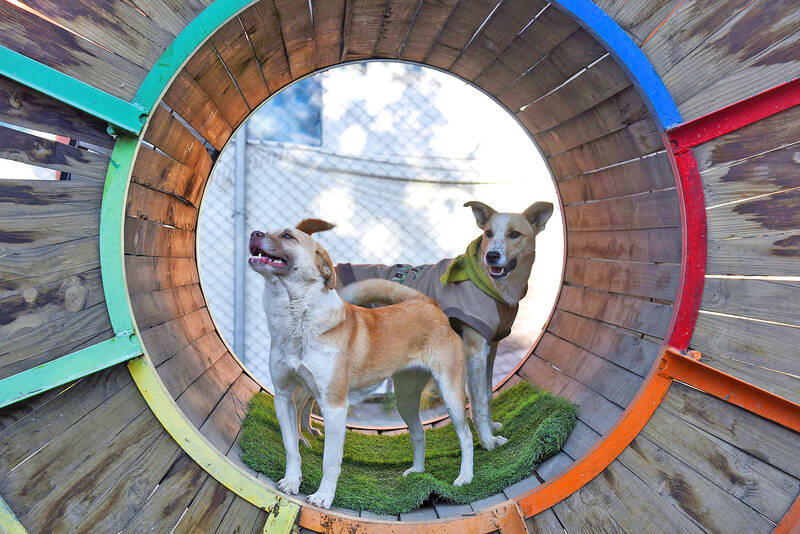The ability of dogs to sniff out stress levels in humans has been known for some time.
But the relationship between woman and man’s four-legged best friend is two-way, and scientists now believe they have discovered that when a dog senses a person in distress, it has a knock-on effect in the behavior of the animal — most notably, it makes them pessimistic.
New research is believed to be the first to test how dog owners’ emotional states can affect their pets.

Photo: Reuters
Nicola Rooney, senior lecturer at the University of Bristol’s veterinary school and lead author of a paper on the subject, said: “Dog owners know how attuned their pets are to their emotions but here we show that even the odor of a stressed, unfamiliar human affects a dog’s emotional state, perception of rewards and ability to learn.
“Working dog handlers often describe stress traveling down the lead, but we’ve also shown it can also travel through the air.”
She added that understanding how human stress affects dogs’ wellbeing was important for dogs in kennels and training companion, working and assistance dogs.

Photo: AFP
The team used a test of “optimism” or “pessimism” in animals to determine whether they were feeling positive or negative emotions after exposure to people’s stressed and relaxed odors.
The researchers recruited 18 dog-owner partnerships to take part in trials in which dogs were trained that when a food bowl was placed in one location it contained a treat but when placed in another location it was empty.
Once dogs learned the difference between these bowl locations, they were faster to approach the location with a treat than the empty location. Researchers then tested how quickly the dog would approach new, ambiguous bowl locations positioned between the original two.

Photo: EPA-EFE
A quick approach reflected optimism about food being present in these ambiguous locations — a marker of a positive emotional state — while a slow approach indicated pessimism and negative emotion. These trials were repeated while each dog was exposed to either no odor or the odors of sweat and breath samples from humans who were feeling stressed from a math test or relaxed after listening to soundscapes.
Researchers discovered that the stress smell made dogs slower to approach the ambiguous bowl location nearest where they had been trained to expect empty bowls. This effect that was not replicated after exposure to the relaxed smell.
These findings suggest that the stress smell may have increased the dogs’ expectations that this new location contained no food, similar to the nearby empty bowl location. The researchers suggested this could be a way for the dog to conserve energy and avoid disappointment.
The team also found that dogs continued to improve their learning about the presence or absence of food in the two trained bowl locations and that they learned the difference faster when the stress smell was present.

On April 26, The Lancet published a letter from two doctors at Taichung-based China Medical University Hospital (CMUH) warning that “Taiwan’s Health Care System is on the Brink of Collapse.” The authors said that “Years of policy inaction and mismanagement of resources have led to the National Health Insurance system operating under unsustainable conditions.” The pushback was immediate. Errors in the paper were quickly identified and publicized, to discredit the authors (the hospital apologized). CNA reported that CMUH said the letter described Taiwan in 2021 as having 62 nurses per 10,000 people, when the correct number was 78 nurses per 10,000

As we live longer, our risk of cognitive impairment is increasing. How can we delay the onset of symptoms? Do we have to give up every indulgence or can small changes make a difference? We asked neurologists for tips on how to keep our brains healthy for life. TAKE CARE OF YOUR HEALTH “All of the sensible things that apply to bodily health apply to brain health,” says Suzanne O’Sullivan, a consultant in neurology at the National Hospital for Neurology and Neurosurgery in London, and the author of The Age of Diagnosis. “When you’re 20, you can get away with absolute

May 5 to May 11 What started out as friction between Taiwanese students at Taichung First High School and a Japanese head cook escalated dramatically over the first two weeks of May 1927. It began on April 30 when the cook’s wife knew that lotus starch used in that night’s dinner had rat feces in it, but failed to inform staff until the meal was already prepared. The students believed that her silence was intentional, and filed a complaint. The school’s Japanese administrators sided with the cook’s family, dismissing the students as troublemakers and clamping down on their freedoms — with

As Donald Trump’s executive order in March led to the shuttering of Voice of America (VOA) — the global broadcaster whose roots date back to the fight against Nazi propaganda — he quickly attracted support from figures not used to aligning themselves with any US administration. Trump had ordered the US Agency for Global Media, the federal agency that funds VOA and other groups promoting independent journalism overseas, to be “eliminated to the maximum extent consistent with applicable law.” The decision suddenly halted programming in 49 languages to more than 425 million people. In Moscow, Margarita Simonyan, the hardline editor-in-chief of the